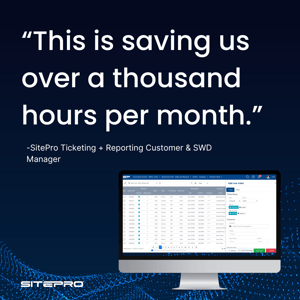Saltwater disposals (SWD) play a critical role in the oil and gas industry. Saltwater, or wastewater, is a byproduct of the oil and gas production process. A SWD well injects that saltwater deep into the ground, where the water will not come into contact with fresh water. Over time, the deposited water becomes trapped in the ground and evaporates.
Because of its nature and potential contact with fresh water, saltwater disposals are heavily regulated by the Environmental Protection Agency through the Safe Drinking Water Act. Different regions and states also have different regulatory standards.
Monthly reporting plays a vital role in ensuring the environmental and operational compliance of SWD companies, but they must maintain those standards for invoicing purposes too. This ensures the producer is properly paid for the saltwater, and any potential mineral rights owners are properly paid for the profits made from the sale of skim oil.
As the name implies, saltwater disposals’ primary job is to dispose of saltwater. However, many SWD operations now “skim” or separate oil from the wastewater to sell. For example, Texas’ monthly P-18 report requires operators to notify the Texas Railroad Commission (RRC) of the amount of water and oil that was received and skimmed each month.
Keeping up with the reporting requirements can be challenging, costly, and time-consuming for ticketing administrators and operators, who must ensure accuracy and compliance while juggling vast amounts of data and information.
But like the rest of the oil and gas industry, technological advances are easing these pain points for SWD employees. As the industry evolves, so too does the landscape of regulatory reporting.
Emerging Technologies
Advanced Data & Analytics
The future of reporting lies in real-time data processing and advanced analytics. Traditional monthly reports are now enhanced with real-time tracking, providing immediate insight for more proactive compliance management.
Not only does that data streamline the reporting process, access to historical data can help saltwater disposal executives forecast future trends and adjust strategy accordingly. So these tools not only encourage compliance, but also enable better business decision-making and risk management.
Digital Ticketing
Another transformative development for saltwater disposals is the implementation of automation. This can streamline the data collection and reconciliation process, reducing the burden of manual ticket entry and editing. Automated ticket data collection eliminates the need for manual entry, significantly reducing human error from messy handwriting, incorrect entry and/or editing, and editing mistakes. This, in turn, leads to quicker, more accurate invoices and regulatory compliance.
Digitizing and automating the ticketing and reporting process greatly enhances operational efficiency. Rather than manually entering thousands of data points, operators can save hours and hours of time a month by digitizing.
Regulatory Reporting Software
As the landscape of oil and gas continues to evolve, so do the environmental standards and compliance regulations. SWD operators can release the burden of worrying about whether they have the correct form by implementing a reporting software that consistently updates forms to maintain compliance with various regulatory agencies.
Digital regulatory forms that auto-fill information also help SWD administrators and operators save time.
User-friendly Experience
Another plus-side to incorporating ticketing and reporting software into your disposal operations is the user-friendly interface of many software applications. This makes the process much easier and intuitive for ticketing administrators. Customizable dashboards help them easily navigate through, edit, and reconcile tickets. Software that's easy to use (and easy on the eyes) ensures that SWD are getting paid for the produced water they're processing and that other parties are appropriately paid for skim oil.
Like the rest of the oil and gas industry, saltwater disposals can greatly benefit from and optimize their operations with the emergence of these technological advancements. Embracing these tools can help businesses ensure accuracy, efficiency, and compliance, making it easier for ticketing administrators and streamlining overall business.
Your New Favorite SWD Software
SitePro offers a robust digital ticketing and reporting software platform. Our software allows users to input data, bulk edit ticket information, export that information for invoicing, and easily transfer that information for reporting purposes (with forms that are already available and updated in the software.)
Our Ticket Center is integrated with the Texas RRC’s permit data for leases and wells, which helps minimize human error that can occur during ticket entry and drastically reduces the time it takes to upload, edit, and consolidate tickets.
SitePro’s Regulatory Center helps save time and reduces labor costs associated with filling out regulatory forms with automated form fill and calculations. The software also automatically creates allocation sheets and letters based on that data so you no longer have to manually create them.
Already have a platform for ticketing? No problem. Our Ticket Center + Regulatory Center software package gives you the power to upgrade any ticketing process you currently have in place. Connect to other platforms or upload paper tickets to edit/consolidate, then complete the digital regulatory form with ease. No hardware required.
And with SitePro, you can optimize your SWD ticketing processes with our Ticketing + Regulatory Center software package for as little as $150/month. Let’s streamline your ticketing and reporting process.
